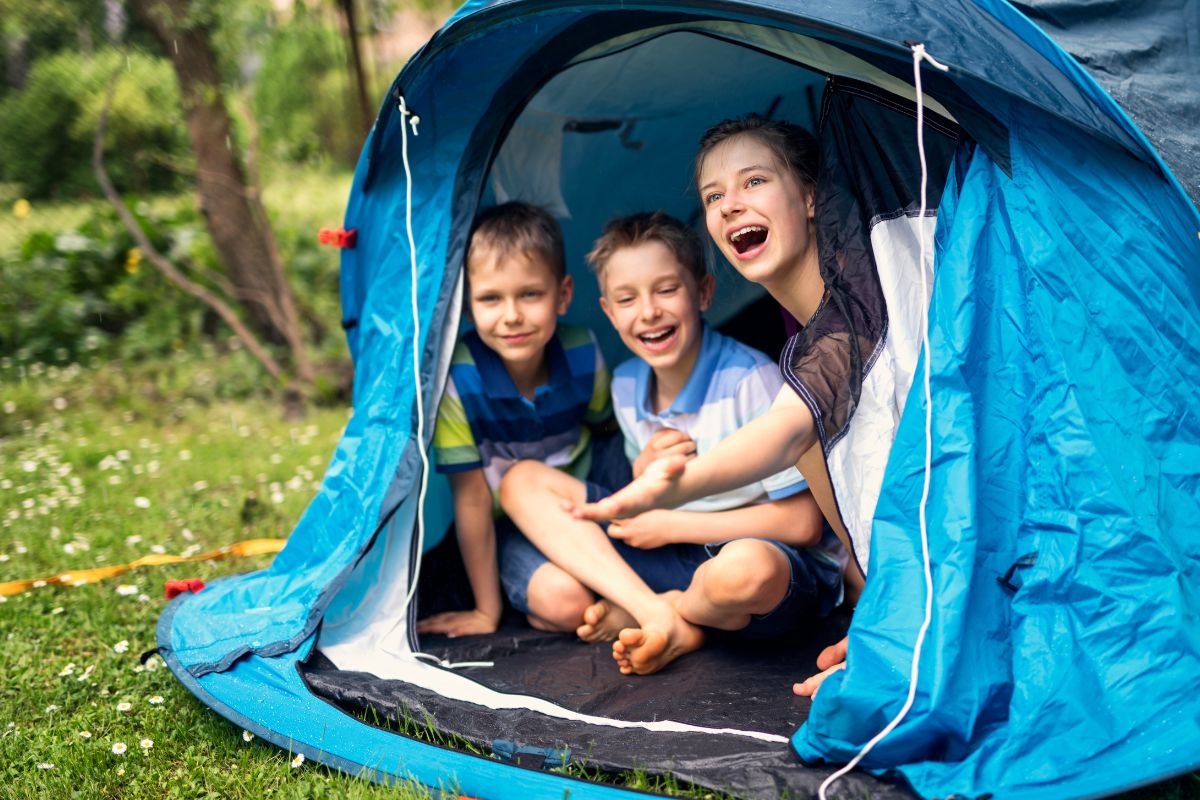Rain and camping may not seem like the perfect pair, but with the right strategies, you can turn a rainy camping trip into a cosy and enjoyable adventure. While rain can bring challenges such as wet gear and muddy trails, it also offers a unique atmosphere that can enhance your camping experience. Whether you’re an experienced camper or a newbie, these 10 brilliant tips will help you stay dry, comfortable, and make the most out of your rainy camping excursions.
Rain and Camping: Invest in Quality Rain Gear
One of the most crucial elements for staying dry during a rainy camping trip is investing in high-quality rain gear. Look for waterproof and breathable materials for your rain jacket, pants, and boots. Features like adjustable hoods, cuffs, and ventilation zippers can make a significant difference in comfort. Make sure your gear is properly fitted to prevent water from seeping in, and don’t forget to pack waterproof gloves and a hat.
Rain and Camping: Choose a Well-Designed Tent
A tent specifically designed for wet conditions will keep you dry and comfortable. Look for tents with a full rainfly that extends to the ground and a high water-resistant rating. Consider a tent with a vestibule area to keep muddy boots and wet gear separate from your sleeping area. Proper tent setup is essential; ensure that the rainfly is properly secured and that the tent is pitched on a slight incline to prevent water from pooling underneath.
Rain and Camping: Set Up a Rain Shelter
Setting up a rain shelter outside your tent can provide a dry space for cooking, relaxing, and storing gear. A tarp or canopy can be set up between trees or poles to create a dry area. Ensure the shelter is well-anchored and angled to allow water to run off easily. This extra space can also be invaluable for keeping your tent interior clean and dry.
Rain and Camping: Use Waterproof Bags for Gear
Keeping your gear dry is essential for a comfortable camping experience. Use waterproof bags or dry sacks to protect your clothing, sleeping bag, and other essentials. For added protection, pack your gear in waterproof liners or resealable plastic bags within your backpack. This simple step will ensure that your belongings remain dry, even if you encounter heavy rain.
Prepare for Muddy Conditions
Rain often results in muddy trails and campsites. Prepare for these conditions by packing extra pairs of socks and a change of clothes. Waterproof gaiters can help keep mud and water out of your boots. When setting up camp, choose a site that is less prone to flooding and avoid placing your tent in low-lying areas where water may collect.
Keep Your Tent Ventilated
Proper ventilation is crucial when camping in the rain to prevent condensation from building up inside your tent. Most tents come with built-in vents, but you can also create additional airflow by slightly opening the tent’s windows or doors. Ensure that the rainfly is designed to keep rain out while allowing for adequate ventilation.
Maintain a Dry Sleeping System
A dry sleeping system is key to a good night’s rest. Use a waterproof or water-resistant sleeping pad to keep moisture from seeping through from the ground. Store your sleeping bag in a waterproof sack and avoid placing it directly on the ground. If your sleeping bag does get wet, dry it out as best as you can by hanging it up or using a camp dryer.
Keep Your Campfire and Cooking Area Dry
Cooking and staying warm can be challenging in the rain, but a well-protected cooking area can make a big difference. Use a rain shelter or tarp to cover your cooking area and keep your firewood dry. Consider using a portable stove or gas burner instead of an open fire, as it is less affected by wet conditions. Always follow safety precautions and keep your cooking area well-ventilated.
Stay Hydrated and Energised
Rainy weather can affect your energy levels, so it’s essential to stay hydrated and well-fed. Bring plenty of water and high-energy snacks that are easy to prepare. Foods like nuts, dried fruits, and energy bars are great options. Avoid alcohol and caffeine, as they can dehydrate you and affect your body’s ability to stay warm.
Embrace the Rain
Finally, embrace the rain as part of your camping experience. Rain can create a unique atmosphere and provide a soothing backdrop for your adventure. Enjoy the sound of rain on your tent, explore the beauty of wet landscapes, and take advantage of fewer crowds at popular spots. With the right attitude and preparation, rain can enhance your camping experience rather than detract from it.
Conclusion
Rain and camping may present unique challenges, but with the right preparation, you can transform a rainy outdoor adventure into a comfortable and enjoyable experience. By investing in quality rain gear, choosing the right tent, and setting up effective rain shelters, you can stay dry and cosy. Embracing the rain and understanding how to manage muddy conditions will help you make the most of your camping trip, regardless of the weather. With these 10 brilliant tips, rain and camping can become a memorable part of your outdoor adventures.
FAQs
1. What should I look for in a tent for rain and camping?
For rain and camping, choose a tent with a full rainfly, high water-resistant rating, and good ventilation. Ensure it’s well-anchored and pitched on an incline to avoid water pooling.
2. How can I keep my gear dry during rain and camping?
Use waterproof bags or dry sacks to protect your gear. Pack your belongings in waterproof liners or resealable plastic bags within your backpack for added protection.
3. What are some tips for staying dry while camping in the rain?
Invest in quality rain gear, use waterproof bags for your gear, set up a rain shelter outside your tent, and keep your tent well-ventilated to stay dry and comfortable.
4. How do I handle muddy conditions while rain and camping?
Prepare for muddy conditions by packing extra socks and a change of clothes. Use waterproof gaiters to keep mud out of your boots and choose a campsite less prone to flooding.
5. Can I still enjoy activities while rain and camping?
Yes, you can enjoy activities by setting up a covered area for cooking and relaxing. Embrace the rain by exploring wet landscapes and enjoying the unique atmosphere it creates.
Also read: Things to Do in Easter Holidays: 10 Exciting Activities for All Ages





